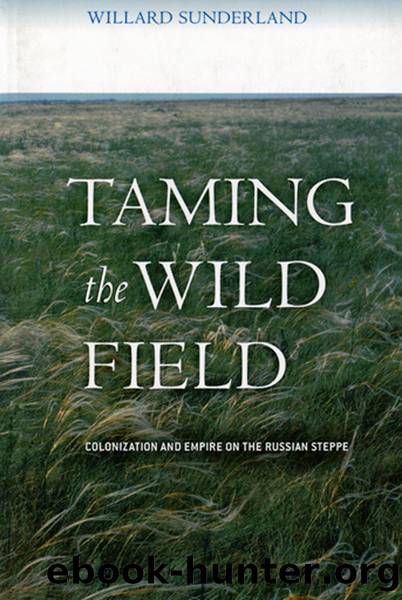Taming the Wild Field by Willard Sunderland

Author:Willard Sunderland
Language: eng
Format: epub
Publisher: Cornell University Press
Published: 2015-11-28T00:00:00+00:00
To avoid a similar fate, the Smolensk settlers required funds to support themselves on the road as well as until their first harvest, loans to provide for âtheir full establishment in their new places,â a five-year exemption from taxes and âall duties,â gentle terms for the repayment of their loans, and fifteen desiatinas of land per male soul. The settlers also needed to plan their relocations more practically: the decree instructed them to dispatch an advance party to select their new lands, build new homes, and begin planting, with the idea that, after final approval from the authorities, the rest of the migrants would follow, resettling in groups of no more than thirty households âto avoid problems with quartering and provisioning along the way.â96 Local officials would provide for the settlersâ safekeeping while in transit and determine the extent of their needs on a case-by-case basis once they arrived. Peasants remaining in their original villages were also to assist the settlers financially, with the specific amount and form of the assistance determined by the local provincial administration. To avoid any âconfusion in accounts,â the minister of Internal Affairs would inform the minister of Finance every year of the amount to be dispensed to the settlers âin keeping with the norms that apply to the expenditures on foreign colonists.â And the settlers themselves were to be placed under the âspecial tutelage of the New Russian Guardianship Office,â the administrative organ of the southern foreign colonies.97
The 1805 decree applied only to the Smolensk case, though Kochubei hoped that its provisions might ultimately serve as âgeneral rulesâ for âthe resettlement of all peasants from provinces with little remaining open land.â98 As it turned out, however, specific resettlement terms continued to fluctuate in the early decades of the nineteenth century, varying across different decrees, and only in isolated incidents were subsequent domestic settlers placed under the foreign colonistsâ administration.99 Also, despite the offer in one instance of fifty desiatinas of land per household and draft exemptions of up to five years,100 the material incentives pledged to domestic steppe-bound settlers remained limited compared to those offered to foreign colonists, at least while new foreign colonists continued to be admitted into the empire. The reason was simple: it was presumed that the government could get away with offering less to domestic migrants.101 Furthermore, being too magnanimous with peasants was ill-advised. As the Kherson military governor and the director of the Guardianship Office argued in 1806, if Russian peasants ever found out that they could receive all the material privileges offered to foreign colonists, they would rapidly deplete the treasury by âresettling in droves,â and even those who did not have to relocate would do so just to get the benefits.102 (A similar line of reasoning was voiced in the early 1800s regarding offering exemptions from the draft; such exemptions, as a result, were only rarely decreed.)103 Yet even with its restricted scope, the Smolensk initiative signaled an important shift: for the next half century, the resettlement
Download
This site does not store any files on its server. We only index and link to content provided by other sites. Please contact the content providers to delete copyright contents if any and email us, we'll remove relevant links or contents immediately.
The 5 Love Languages: The Secret to Love That Lasts by Gary Chapman(9777)
The Space Between by Michelle L. Teichman(6926)
Assassin’s Fate by Robin Hobb(6194)
Wiseguy by Nicholas Pileggi(5765)
Everything Happens for a Reason by Kate Bowler(4729)
Gerald's Game by Stephen King(4636)
Pillow Thoughts by Courtney Peppernell(4271)
A Simplified Life by Emily Ley(4156)
The Power of Positive Thinking by Norman Vincent Peale(4053)
Harry Potter and the Prisoner of Azkaban (Book 3) by J. K. Rowling(3346)
Resisting Happiness by Matthew Kelly(3335)
Girl, Wash Your Face by Rachel Hollis(3275)
Being Aware of Being Aware by Rupert Spira(3271)
The Code Book by Simon Singh(3172)
The Secret Power of Speaking God's Word by Joyce Meyer(3161)
More Language of Letting Go: 366 New Daily Meditations by Melody Beattie(3017)
Real Sex by Lauren F. Winner(3005)
Name Book, The: Over 10,000 Names--Their Meanings, Origins, and Spiritual Significance by Astoria Dorothy(2969)
The Holy Spirit by Billy Graham(2938)
